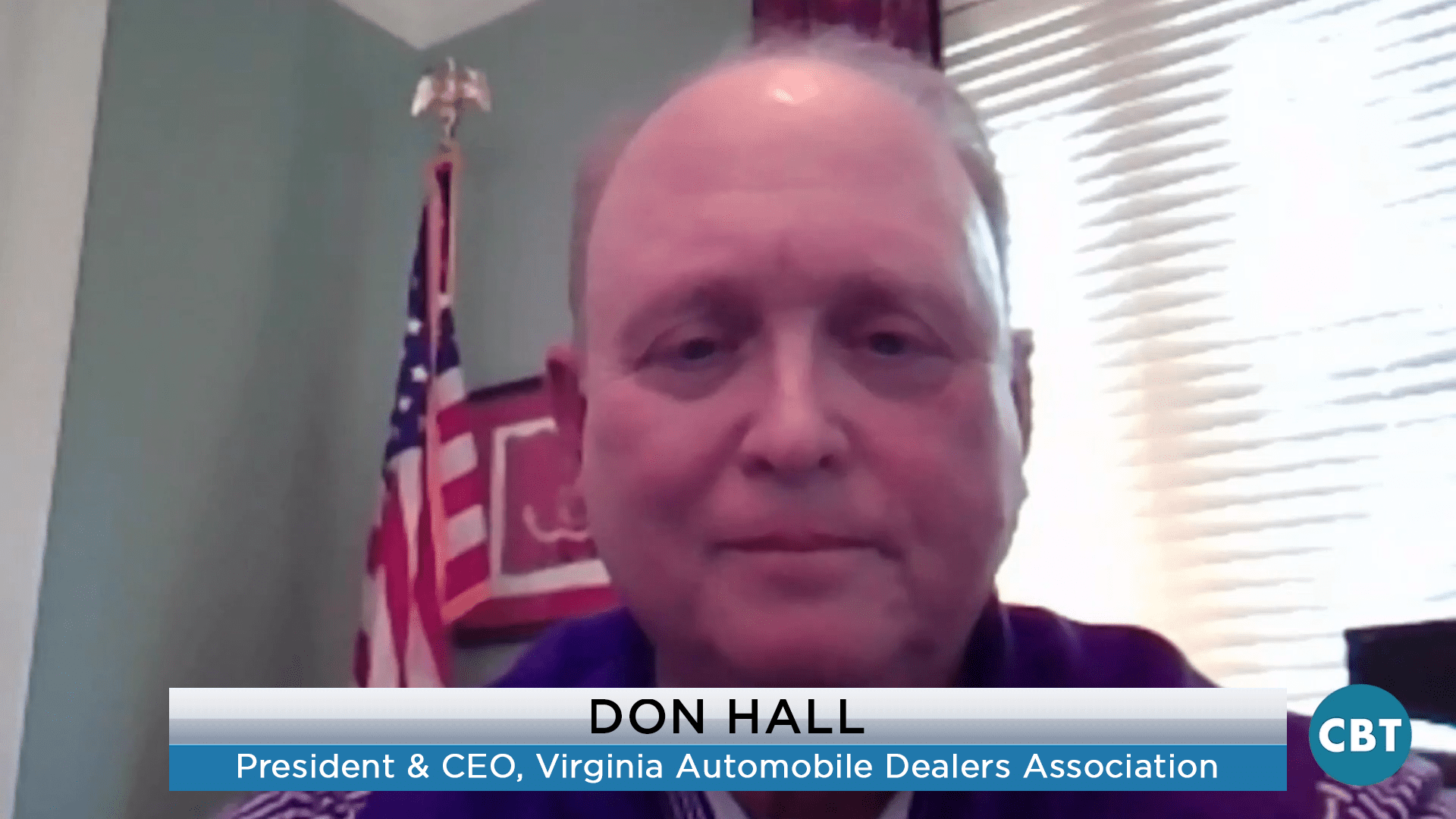Every dealer knows there are ways in which the auto industry needs to change in order to attract talented employees, especially women. On today’s show, we check out Jim’s recent interview with Don Hall, president and CEO of the Virginia Automobile Dealers Association. In addition to talking about recruitment, Don and Jim discuss federal changes in gap insurance and other big agenda items for 2019.
VIDEO TRANSCRIPTION:
Jim Fitzpatrick: Let’s talk about 2018, and some of the things that you were able to get accomplished there.
Don Hall: Well first of all, as we know from the car business, a car isn’t sold until it goes over the curb. And we had a successful legislative session for sure, but until the governor either amends or vetoes, nothing’s done until it’s done. But, as you would expect, we had a number of issues this year dealing with the relationships between the factories and car dealers. Again, always with the effort to keep a level playing field. We don’t want advantage over the manufacturers. It’s naïve to think we would ever have one. A level playing field is our goal. The bills [inaudible 00:01:19] this year had to do with a level playing field; as an example, the right of first refusal, meaning giving the rights to a property owner vis a vis a car dealer to be able to sell their dealerships, their chain of stores, to whomever they choose to sell them to, assuming they meet the qualifications and so forth.
Jim Fitzpatrick: Sure, sure, and that’s a bit element, I mean – especially with all the buy/sell activity that’s taking place right now in the auto space, right?
Don Hall: Well, you spend your lifetime building these nest eggs and building up these organizations and you should have the right to sell it, and what’s happened because of case law is the ability for a manufacturer to literally pluck or cherry pick a franchise which drives down the entire value of the entire buy/sell, if not even, frankly, causes the buy/sell to go away. So it’s important the dealers have the right when they’re buying, to buy what they think they’re going to get, and selling to sell what they’ve got as a package because the sum of the parts is worth more than the individual parts.
Jim Fitzpatrick: Yeah, very good point. Let’s switch gears a little bit and talk about something that is near and dear to your heart as well as mine, and that’s the Tesla issue. So what do you think about the announcement by Elon Musk to do away with retail locations and just do everything online?
Don Hall: To a large degree, it’s sort of what he’s done. He’s had some presence, as he’s required to do so by law, but the fact is, as I said the other day, and I appreciate the question, Jim, because [inaudible 00:02:40] historical on this, but they left out about 95% of what I said.
And here is my message, and I hope that maybe someone on Mr. Musk’s team will get this message, and that is, “look, if you want to make money, if you want to sell car, if you want customer appreciation, if you want folks to enjoy the experience, I’ve got a number of dealers in the Commonwealth of Virginia today who are willing to represent, you don’t have to go online, we can do it for you, we’ll create the facilities that you want, the buying and selling process that you want, and so I don’t think his idea is very good, and I think, at the end of the day, as we’ve seen from other issues he’s got going on, as we speak, that he is heading down a course that is going to make it impossible for him to return. That’s my prediction and opinion.
Jim Fitzpatrick: What do you say to Elon Musk’s people that say “dealers can’t handle selling our vehicles, they’re too sophisticated”?
Don Hall: There are four hundred dealerships in Virginia today that you can buy either an all-electric or a hybrid type car. We can handle and sell anything that you give us to sell, with the proper training and so forth. [inaudible 00:03:45] dealerships are very sophisticated, we have the ability to sell whatever a manufacturer will produce, we can sell it, give us the chance to do so.
Jim Fitzpatrick: And you can service it?
Don Hall: 100% and if the concern is, “well, you don’t want to do it because service may be less than.” Well we know from reading the various blogs and other things, there’s still service opportunities with these cars, [crosstalk 00:04:04] but the fact is people may want a Tesla to drive, that electric car experience, but they’re going to have other cars as well and my dealers are willing to commit to this. [inaudible 00:04:12] they’ll have a chance to sell other cars to that same customer who wants an electric car in their inventory as well as an SUV of some sort that may be an internal combustion engine.
Jim Fitzpatrick: Right, right. So let’s switch gears once again and come in off the Elon Musk Tesla story about moving their sales process online. We hear a lot now in the industry about ‘digital retailing’, allowing somebody to just purchase a car from the comfort of their living room or office. What’s your take on that and how long do you think it will be before we see the majority of car sales being done this way?
Don Hall: What’s interesting had this discussion the other day about the fact she was ordering her groceries through Amazon, and they’re being delivered to our home. Not real comfortable with the concept, deep down inside, but she assures me it’s less impulse buying and we get the best of the whatever they bring to our home. I’m reminded, I’m not this old, but I remember the stories as a young man entering the car business forty years ago that we used to sell cars to people at their homes.
And we used to deliver milk to people’s homes, that I do remember. And so this idea of making things better, more convenient, oh, wait a minute, there’s nothing new or unique about that. We got away from it, the factories drove us away from it to a large degree, with brick and mortar commitment. The reality is, however you want to buy a car is how we need to help provide that experience. But ultimately, you need someone in your community to make sure things are running right, taken care of properly and that you’ve got some relationship to handle whatever issues may come up in the course of car ownership.
Jim Fitzpatrick: I couldn’t agree more. What’s your take on what the industry needs to do as a whole in order to attract a better quality employee, and one that wants to stay with us, at our dealerships, for four, five, ten, fifteen and twenty years?
Don Hall: Jim, you’ve caught me off when you read it because I could talk about this for a long period of time but I do have some thoughts. My thoughts are based on literally forty years of working for dealers, forty years of being with dealers.
And having said that, here’s what I told the senior management at Cox Automotive. I just spent two days down in Atlanta visiting them and their campus and so forth. We can come up with the best tools there are in the world, but the fact is our very foundation is where we hurt the worst, and that is the foundation of the people. It’s hiring and retaining good people.
And part of what I’ve observed here at the Virginia Automobiles Dealers Association, we’re blessed to have a very significant insurance involvement with our car dealers. We have a very large insurance agency that we own that handles all the health insurance, worker’s [inaudible 00:06:49], the disability products and so forth for our dealerships. Unfortunately, as an industry, we lag far behind others in terms of our benefits structure. We lag far behind in vacation structure. We don’t do things. We expect people today, in today’s environment to work 50 or 60 hours a week. People need to make a livable wage. Now there’s a new concept! Paying a wage they can live on and manage them and [inaudible 00:07:18] these expectations and let them work 36 to 38 hours a week.
You do that, and we can go out and compete with any other industry. But the days of commission, if you don’t make enough you’re out of here, you got to work 60 hours this week, ladies and gentlemen that is our weakness and it prevents us from doing the technology and having the right people to understand it. It makes the buying experience a bad experience. If we don’t get a hold of this, now let me give you a great example, most dealerships consider a two week vacation to be extraordinarily generous. At many companies, Cox is an example, has no vacation policy. What do you mean by that? You take what you need.
Jim Fitzpatrick: Wow. That’s pretty progressive.
Don Hall: You take what you need. [inaudible 00:08:04] and you take what you need. Look, the idea of a three week vacation would be foreign to many, we are not going to attract that recent college graduate into our ranks, or retain that person who’s 32 years of age and has just gotten married and wants to have two or three kids down the road. [crosstalk 00:08:19] We’re not going to retain them if we operate the way we have for the last thirty five or forty years.
We got to treat them to way we want to be treated. Now, having said that, and this is a little hard to hear but easy for me to say. We got to walk the talk. As senior management, you take liberties to be gone when you want to be gone. You may even own stores and be out of those stores for lengthy periods of time. We cannot have a double standard, we lead by example. If it’s good enough for you to have time off and free time, you’ve got to provide it for your working people. Then you start getting really good people in our business who work regular hours, shift work if you will, and they attract people who want to be in the business for a long period of time.
Jim Fitzpatrick: That’s for sure, that’s for sure. In addition to that I might add the salary part of that where you’re giving them a living wage is huge for people coming into the industry isn’t it?
Don Hall: It is huge. Look, the industry has always been this, we’ve always had sales managers and general managers. They manage the process, they’re not managing the people. We’re going to have to change that. Now when you’re a sales manager, if you will, we’re gonna pay our people a starting wage, a living wage, as an example. Just for example, sixty five thousand dollars to start. But you got to manage them to make sure you’re getting good return on your investment. Yes, you’re going to have manage the people, yes you’re going to have to train, yes you’ll have to enforce and lead by example and so forth.
Don Hall: But instead of having someone being told, “Look, if you work hard you can make sixty five thousand dollars a year,’ what happens is, they get desperate. They see that they’re not doing well, they’re not getting the support, “oh well, don’t worry about, we can hire someone else to take their role.” Ladies and gentlemen, we have absolutely got to change the way we approach our people and how we hire them and how we pay them.
Jim Fitzpatrick: Let’s talk about attracting females into the industry, whether it be at the showroom level or the service drive or technician or back office or general managers and dealers? What does the industry need to do in order to break this mold of just having men run dealerships and have more females on showroom floors and in service centers?
Don Hall: First of all, I appreciate the question. As a man with a wife, two daughters and three of my six grandchildren are females [crosstalk 00:10:44], I am very sensitive to this subject matter. Historically, our business, I think oftentimes, has permitted an environment that frankly should not be allowed. That is this male macho bravado. I was a part of this as a young man, in the background you’ll see a flag and Marine Corps, but the bottom line is those days are long gone gentlemen, if you’re listening here.
We have to have an environment that is safe and secure for everyone, regardless of one’s gender, ethnic makeup, religious background or whatever else. But the fact of the matter is we have oftentimes allowed behavior to be such where woman and others may not feel comfortable in our environment. Shame on us. It is time to change. We all know that the large percentage of females make the decision in the driving, in terms of who buys what and where and so forth.
Again, we need to have an environment where there are hours, there is a livable wage, I think this will appeal to a lot of younger people regardless of their gender, but also [inaudible 00:11:53] a lot of women out there, women who are on their own, women who are single parents, women who are married, it just doesn’t matter [crosstalk 00:12:00] but we’ve got to make sure our environment is one that has no threats, there is no sexual connotations.
As a dealer, I don’t care who’s your best sales manager, your best general manager, or your best salesperson, if they are doing these kinds of activities they are fired, end of statement. You do that and you have that culture. I have dealers who have women throughout their organizations and part of their success is predicated on the fact that they have a work zone that is a safe zone, that is exciting and fun and rewarding, regardless of who you are or where you came from. I’m proud to say in Virginia I’ve got a number of female car dealers in Virginia who are as good or frankly better than most, they are good at what they do and as a result they’ve employed lots of women in their organization and they are very very impressive dealer groups.
Jim Fitzpatrick: Sure, not to mention Mary Barra. Look at the job she has done with GM since taking the reins there. I don’t think anybody saw that coming and she has done a phenomenal job in her position, right?
Don Hall: [inaudible 00:13:09] the wife that I have in my life and – I know your wife – the wife in your life, we’re better for it and they make us better, I’m glad they’re our partners and they should be our partners in business as well, beside just being our spouse if you will.
Jim Fitzpatrick: This is true. This is true and my wife, my partner is way better than me at this than I am, so I hear exactly what you’re saying. So let me ask you, what are some of the big items on the agenda for your association for 2019?
Don Hall: I think right now part of our, frankly it’s one of the questions you asked me, which is continue talking about how we can make the dealership environment a better environment. What I want to do with my dealers is to keep reminding them that, “look, you have to be smart about it, but you must embrace technology,” that consolidation is absolutely here, it will continue in our industry, it’s not going to change.
And so you’ve got to embrace the future, you’ve got to be part of that or you’ll be left behind. Let me bring up one of the quick subjects as well. I am very concerned in Virginia, as in North Carolina and California, the Military Lending Act.
Jim Fitzpatrick: I had that next on my list, I’m glad you’re going there.
Don Hall: Why don’t you go ahead and go there and then I’ll answer that?
Jim Fitzpatrick: [laughing 00:14:19] Well I was going to talk to you about the changes in the Military Lending Act, I know obviously as an ex-Marine you’ve got to have some feelings about this.
Don Hall: Well Jim, two things. There may be ex-Army, Navy and Air Force and so forth, no such thing as an ex-Marine.
We’re former Marines no longer in uniform because they don’t fit any longer! That’s a lifetime calling, so ooh-rah [crosstalk 00:14:40] and if there is any out there listening they will understand that statement.
Look, it is a crying shame that bureaucrats have made a decision that those that can least afford a deal with a wrecked vehicle, a damaged vehicle, cannot buy gap insurance, and they have be inserted themselves into this process, we are going to allow them to make the decision. No question, every consumer deserves proper disclosure, properly understanding what they are buying and then they make a decision. But for bureaucrats who oftentimes make more money than people in the military do, it is flat wrong to do that and this thing is caught in the bureaucracy in the worst way. With bureaucrats holding it up, nothing is moving very quickly.
We’ve had some real life stories, [inaudible 00:15:25] News carried one last week about a Marine, coincidentally from down [inaudible 00:15:28] who had wrecked a Camaro. The fact of the matter is, it is outrageous to think that bureaucrats are deciding on what those of us that are in the military can and cannot do with our dollars, after hours and how we spend them.
With proper disclosure, consumers have a right, regardless of what uniform you wear during the day, to make their own decisions. It is despicable and I keep hoping this administration will do this. Now, we had a great Congressman from Virginia, Scott Taylor, a Navy SEAL, who is helping us out tremendously on this. Unfortunately, he lost his election, so we’ve lost our momentum, at least with Scott’s directly involvement here in Virginia.
Jim Fitzpatrick: Right, right. And unless the military wants to step up to the plate and offer free gap [laughing 00:16:12] insurance for all of their people, I guess that’s a different story, right, but that’s not going to happen.
Don Hall: Jim, here’s a part of this story that is not well known. The fact of the matter is, if you finance the car with the Navy Federal Credit Union and other military credit unions, they in fact can sell gap.
[crosstalk 00:16:33] So they have made the decision that with their own lending arms that are not directly owned or involved with the Federal government but there’s a direct connection. They’ve said it’s okay there but they can’t do it anywhere else. Now you talk about restraining trade, you talk about picking winners and losers, this is not a role this government should be in, and certainly not this administration that prides itself on saying that, “we want the free market to drive the decisions and not bureaucrats to drive them.”
Jim Fitzpatrick: Totally agree. Before I let you get out of here and I appreciate all the time you have given us today, talk to us about, from your perspective, and you are working with hundreds of dealers everyday and you have your hand on the pulse of what is happening in retail automotive today. If you had to pick one thing that dealers should focus on, moving into 2019 and beyond, to run a more efficient dealership and a more profitable dealership, what would that one thing be?
Don Hall: Before I answer that, I’ll make the assumption, that you get it that the most important asset you have are your people, I’m going to make that assumption.
Jim Fitzpatrick: Right.
Don Hall: With that assumption, that you already understand that concept, and you are pursuing a life of having your assets taken care of, meaning your people, then I think you must embrace technology wholeheartedly. Now, I have dealers say to me all the time, “Oh I embrace technology, absolutely, I’m all about this.” I met with the folks from Cox, “this is great.”
But what you learn is, beyond that, they themselves have no idea [laughing 00:18:02] what is going on or not. There is not a culture of making sure it is being done after we buy a product. [crosstalk 00:18:10] So, my comment is technology is your friend, you are not going to change the way a customer buys a car, they want to have technology, they want to make the process smooth and easier. Embrace it, make it part of your culture, part of your DNA, and make sure that you understand that and as the leader of your organization you are in fact teaching others by your example and so that people are saying, “it really is who we are, it is not just something we did to say that we’ve got this or that in the organization.”
No you have done it and now you embrace it. Without it, you are not going to succeed. It is the only way going forward that you can succeed.
Jim Fitzpatrick: Well, Don Hall, AKA Bill Gates, I want to thank you so much for joining us on CBT News, we very much appreciate all the time and best of luck to you at the VADA, hopefully we can have you back in a few weeks, see how everything is going and touch on some of these other topics I didn’t get to today.
Don Hall: Thank you, Jim, good luck to you and your viewers. Take care.








